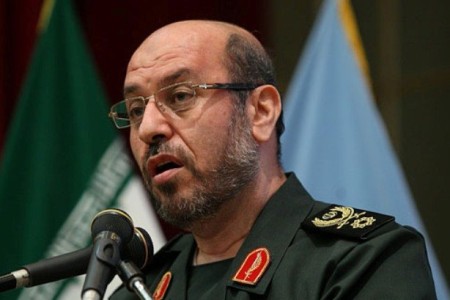LATEST
- Parliament to Investigate Conditions in Iran’s Prisons
- Supreme Leader: US and Britain Trying to Cause Rifts Between Shia and Sunni Muslims
UPDATE 1245 GMT: The Supreme Leader’s senior advisor, Ali Akbar Velayati, has said that Tehran will respond to any request from Baghdad over assistance to reverse the Islamic State’s capture of Ramadi.
“If the Iraqi government officially asks the Islamic Republic of Iran…to carry out any step that helps Iraq to confront [the Islamic State]… then the Islamic Republic of Iran will meet this call,” Velayati told Reuters TV.
Iran’s Defense Minister Hossein Dehghan (pictured) has suddenly traveled to Baghdad for talks, as the Islamic State captured the Iraqi city of Ramadi, 80 miles to the west of the capital.
Iranian State media is framing the trip as a follow-up to the three-day visit in Tehran last week of Iraqi President Fuad Masum.
However, the catalyst is likely to be the Islamic State’s advance. The militants rapidly took Ramadi, the capital of Iraq’s largest province Anbar, after launching their offensive last Thursday. Within 24 hours, they had claimed the Government buildings, and on Sunday, they completed the victory with the withdrawal of the last Iraqi forces.
Prime Minister Haidar al-Abadi has promised that Iraq’s Shia militias, supported by Iran, will help the military reclaim Ramadi.
The militias were instrumental in the recapture of Tikrit from the Islamic State in late March.
Iran’s State media is already proclaiming, “Shia Volunteers Converge on Ramadi to Dislodge ISIL“.
Iran has supported Baghdad and the militias with weapons, supplies, and commanders, including Qods Force head Qassem Soleimani, since the Islamic State’s offensive in June 2014 captured Tikrit and Iraq’s third-largest city Mosul.
The Islamic State is still in control of Mosul, which it proclaims as the center of a caliphate to be established across the Middle East.
Parliament to Investigate Conditions in Iran’s Prisons
The head of Parliament’s Judiciary and Legal Commission has said an investigation will look at “the conditions in prisons, the facilities and services that have to be offered, as well as an audit of the prison budgets and compliance with standards”.
Abolfazl Aboutorabi said the target of this inquiry will be the detention centers that “should be under the supervision and rehabilitation measures of the Prison Organization but for some reason are not under their control”.
Among Iran’s 210,000 prisoners are hundreds of political detainees, including many seized after the disputed 2009 Presidential elections. Those detainees, their families, activists, human rights organizations, and the United Nations have repeatedly cited poor conditions and abuses in the facilities.
In summer 2009, the Supreme Leader promised that something would be done about detention centers after three political prisoners, including the son of a prominent conservative political activist, died from torture in the Kahrizak facility.
No reforms were ever announced, and it was years before any official was held accountable for the deaths.
Supreme Leader: US and Britain Trying to Cause Rifts Between Shia and Sunni Muslims
In his latest jab at the West, the Supreme Leader has accused Britain and the US of trying to divide Shia and Sunni Muslims.
In a written statement read out at a ceremony in Iranian Kurdistan, Ayatollah Khamenei said London was an “old hand” at creating rifts. He specifically challenged a provision in a US Senate bill, introduced earlier this month, which envisages the partition of Iraq into Shia, Sunni, and Kurdish sections.
“They are against anything which has a sign of Islam, and to them, there is no difference between Shias and Sunnis, and issues such as religion and ethnicity are just a pretext for them to sow discord,” the statement asserted.
Khamenei did not refer to the latest developments in Iraq, as the Islamic State captured the city of Ramadi, 80 miles west of Baghdad.

